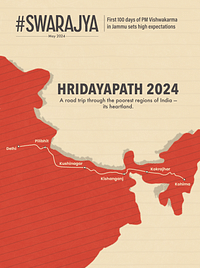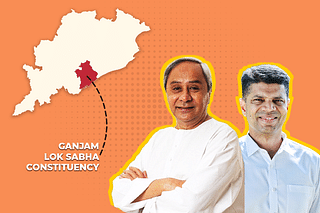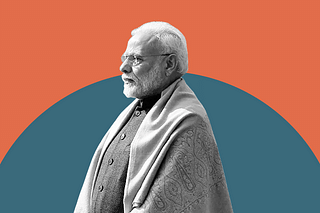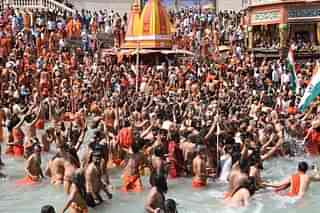Movies
Ratha Thilagam: First Indian Film To Feature The Indo-China War As The Backdrop
K Balakumar
Sep 17, 2023, 03:39 PM | Updated 03:39 PM IST
Save & read from anywhere!
Bookmark stories for easy access on any device or the Swarajya app.
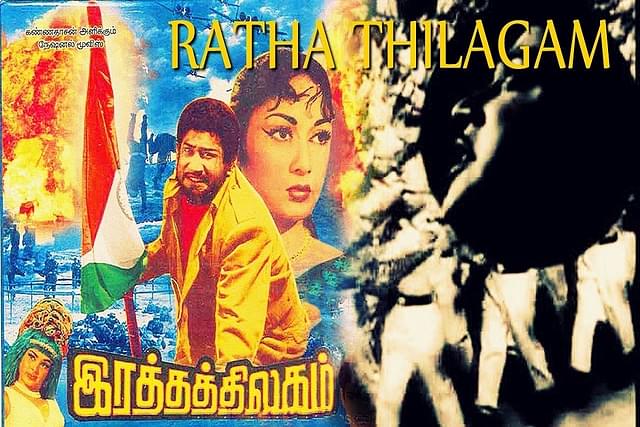
Do you know that there is no identifiable photograph on the internet of the movie director who helmed a decidedly iconic Tamil film, with the most memorable songs? (There is one image of his in his latter period, but it is from a private collection and it is not confirmed that it's him).
The man, who had directed nine other Tamil movies and a Hindi one too, and also written a few more, has no Wikipedia page of him. Also, just going by his name, you can't hazard a guess as to from which part of India he is from.
Ladies and gentlemen, presenting to you: Dada Mirasi (sometimes spelled Dada Mirazi and Dada Mirasee). He was the man who directed the unforgettable Sivaji Ganesan starrer Puthiya Paravai (1964).
A mystery romantic thriller, based on the English film Chase a Crooked Shadow (1958), Puthiya Paravai is celebrated even today for its suspenseful story and the hall-of-famer songs, and, of course, for Sivaji Ganesan's sui generis acting. But little is known of the man who piloted that movie.
Dada Mirasi is believed to be a Kannadiga, at least going by the fact that he wrote the dialogues for a few Kannada movies in the late 50s and early 60s. But he is said to hail from Maharashtra, and he was a lawyer by qualification.
His name first cropped up in these parts in the Kannada film Modala Thedi (1955), as it also had a simultaneous Tamil version Muthal Thethi. It was based on Dada Mirasi's story.
He also wrote the 1958 comedy caper Sabaash Meena, one of Sivaji’s popular fun movies from that era. Dada Mirasi was a regular part of director B R Panthulu’s team.
He was later spotted in the 1960 Kannada film Makkala Rajya. He was the dialogue writer for this film in which Nagesh made his Kannada debut. But this film, which also had a Tamil version (Kuzhandhaigal Kanda Kudiyarasu), may have proved to be a major turning point in Dada Mirasi's career.
In Makkala Rajya, Sivaji Ganesan played a guest role as a scientist. Sivaji was also the lead in Muthal Thethi. The two kind of hit it off when they met during the films' shoot and eventually became good friends.
It was Sivaji Ganesan who helped Dada Mirasi have a reasonably stable career in Tamil as a director. He gave him three films in Tamil.
Dada Mirasi's first movie as director in Tamil was the unheralded 1960 flick Kadavulin Kuzhanthai. A remake of the English film Nobody's Child, it starred Kalyan Kumar and M R Radha, among others. Dada Mirasi also wrote the screenplay of Bale Pandya (1962). As you can see, Sivaji was his constant in those years.
Kannadasan Leaves His Mark
His first most talked-of film as a director, even if not all that successful commercially, was the 1963 September release Ratha Thilagam.
To it goes the credit, of featuring for the first time, the Sino-India war of 1962 as a backdrop in the story. The film had many impressive battle scenes and they were talked about and appreciated much in those times.
Ratha Thilagam was produced by Panchu Arunachalam, even though the rumour then was that he was fronting for Kannadasan, who as it happened, not only wrote all the songs, but was also in charge of screenplay and dialogues.
Not surprisingly, the film has a song that is perhaps the most famous one featuring him in his reflective best — he appears as himself (he is introduced as the former student Muthiah, which is his real name).
And he also sings perhaps the most autobiographical of his lines, Oru koppayiley en kudi iruppu (I reside in a glass of wine).
The rest of the lyrics of the song, sung by TM Soundararajan and set to music by K V Mahadevan, is also seen as very personal from Kannadasan. It is among the most analysed for its inner meaning and import.
Ratha Thilagam also has another song that was considered the 'Mustafa Mustafa Don't Worry Musatfa' of its generation, in that it was hugely popular on the last day of the college. The song, Pasumai Niraintha Ninaivugale, has Sivaji and Savithri crooning on the farewell day.
Ratha Thilagam's story is said to be inspired by the Bengali romantic hit Saptapadi (1961), starring Uttam Kumar and Suchitra Sen in the leads. That Bengali movie featured a famous Shakespearean scene. One from Othello, with a voice over from Utpal Dutt and Jennifer Kapoor.
Interestingly, Ratha Thilagam retained the English background voice but the scene was enacted by Sivaji and Savithri playing Othello and Desdemona.
The latter eventually murders her, and, as it happened, Sivaji had earlier enacted the same Othello character in a much older Tamil film Anbu (1953) (One of the edgy Tamil movies that dealt with the taboo subject of incest, but that is a story for another day).
Ratha Thilagam's recreation of the war scenes, shot by Jagirdhar, were something of a novelty in those times. It also had an intriguing dance number featuring Mala of Sasi-Kala-Mala (Madras Sisters) and Sivaji in disguise.
Another highlight was a rock n roll English song, Happy Birthday, rendered by one Suzi Miller.
Still staying with songs, Ratha Thilagam also featured a famous song, Thazham Poove Thanga Nilave, sung by TMS and LR Easwari, that doesn't actually figure in the movie. It was never canned, and is considered as a 'discarded diamond' by Tamil film music buffs.
The Enigma Of Dada Mirasi Lives On
Trivia collectors may note that Ratha Thilagam was the debut vehicle of the actor Shanmugasundaram of (much later) Karakattakaran fame, and the face behind 1,000s of memes Bowling-a? Fielding-a?
Ratha Thilagam, even if praised by critics, did not do all that well, and its Telugu and Hindi dubbed versions didn't do well. But Sivaji was impressed with Dada Mirasi and worked with him the very next year in that extravagant blockbuster Puthiya Paravai.
The duo much later in 1971 did the well known Moondru Deivangal.
In between, Dada Mirasi also helmed the 1967 film Raja Veetu Pillai. Its original name was Inba Nila with MGR as the hero. But it got shelved, and was revived as Raja Veetu Pillai starring Jaishankar and Jayalalithaa. As it happened, this was the film that was gossiped then to have gotten the leading pair close.
Interestingly, in most of Dada Mirasi's Tamil films Nagesh got good roles. And talking of Nagesh, Dada Mirasi had a connection to one of the most well-known scenes to feature the comedian.
The legendary scene in the 1964 film Kadhalikka Neramillai in which Nagesh as a film director narrating a sequence to Balaiah is reportedly modelled on the way Dada Mirasi generally recounts story and scenes.
Dada Mirasi, like he was shown in that film, continued to be an enigma. And to this day, it is not clear whether he is alive or passed away. Oh yeah, that search query too on the internet, throws up no results.
Save & read from anywhere!
Bookmark stories for easy access on any device or the Swarajya app.
Support Swarajya's 50 Ground Reports Project & Sponsor A Story
Every general election Swarajya does a 50 ground reports project.
Aimed only at serious readers and those who appreciate the nuances of political undercurrents, the project provides a sense of India's electoral landscape. As you know, these reports are produced after considerable investment of travel, time and effort on the ground.
This time too we've kicked off the project in style and have covered over 30 constituencies already. If you're someone who appreciates such work and have enjoyed our coverage please consider sponsoring a ground report for just Rs 2999 to Rs 19,999 - it goes a long way in helping us produce more quality reportage.
You can also back this project by becoming a subscriber for as little as Rs 999 - so do click on this links and choose a plan that suits you and back us.
Click below to contribute.
